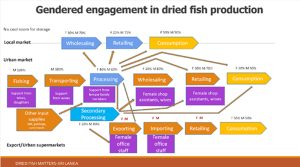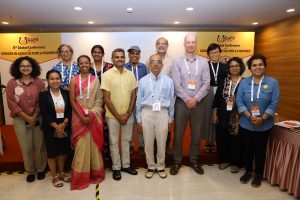Being conducted in six countries across South and Southeast Asia, the Dried Fish Matters project is a first-ever exploration of the gendered social economy of dried fish
By Derek Johnson (derek.Johnson@umanitoba.ca), Professor & Head Department of Anthropology, University of Manitoba, Canada, Nikita Gopal (nikiajith@gmail.com), Principal Scientist & Head, Extension, Information & Statistics Division, ICAR-Central Institute of Fisheries Technology, Kochi, India, Kyoko Kusakabe (kyokok@ait.ac.th), Professor, Gender and Development Studies, Department of Development and Sustainability, Asian Institute of Technology, Thailand, Tara Nair (tara01@gmail.com), Director (Research) Work Fair and Free Foundation, Bengaluru, India, and Mirza Taslima Sultana (m.taslima@juniv.edu), Professor, Department of Anthropology, Jahangirnagar University, Dhaka, Bangladesh
Dried Fish Matters: Mapping the Social Economy of Dried Fish in South and Southeast Asia for Enhanced Wellbeing and Nutrition, or DFM, is a Social Science and Humanities Research Council of Canada Partnership Grant project. The project spans a duration of eight years: 2018-2026, and involves research in six focus countries in South and Southeast Asia: Sri Lanka, India, Bangladesh, Myanmar, Thailand, and Cambodia. Since inception, the project has also sponsored smaller exploratory studies in Indonesia, the Philippines, and the African Great Lakes region. A large number of institutional partners, collaborators, and students from Asia and Canada are involved in the DFM project, which aims to develop the first comprehensive understanding of the importance of dried fish in South and Southeast Asia from social, economic, cultural, nutritional, policy, and other perspectives.
A central theme in the DFM project’s conceptualization and research from the outset has been gender, with a concern not just to increase the recognition of women’s crucial role in dried fish production and trade but also to develop analytical tools for describing and analyzing social economies of dried fish that integrate feminist theory and methods. The DFM project’s research is led by thirteen research teams in the six countries, including eight in India, in coordination with focused research projects by post-doctoral fellows and undergraduate, master’s, MPhil, and PhD students.
GAF-8, the 8th Global Conference on Gender in Aquaculture and Fisheries, held in Kochi in November 2022 (See Yemaya Issue 67 ‘GAF8: Shaping the future” for more details on GAF-8) provided an opportunity for the DFM project to showcase the gender dimension of DFM, and addressed two objectives: to share the research findings from the first phase of the project and to provide an opportunity for DFM participants to take stock of achievements and plan the remainder of the project. DFM’s contributions to GAF8 were divided into three panels on regional lines: Sri Lanka and Bangladesh, India, and Southeast Asia. Papers were presented by lead researchers or students from each of the focus countries and from most of the DFM research teams.
Women’s commonly unrecognized labour accounts for a significant part of the economic value of dried fish
The panels began with two conceptual introductions by Derek Johnson and Iroshani (Madu) Galappaththi regarding the place of feminist theory in DFM. Johnson indicated that social economy lies at the heart of DFM’s focus on the production, distribution, and consumption of dried fish. Galappaththi argued for an integrative and relational perspective on gender linking feminist intersectionality, value chain analysis, and a social wellbeing approach. DFM views dried fish as a product that has meaning and value in the context of specific places and historical moments. Mapping the importance of dried fish is not therefore limited to dried fish’s monetary value but must include other material, relational, and subjective values such as nutrition and taste.
By showing that women’s work in fisheries is concentrated in processing and trade, a feminist perspective reinforces the shift in fisheries and aquaculture research towards productive work downstream from harvesting in fisheries value chains. A feminist perspective also broadens the scope of economic analysis to show how patriarchal ideology creates the conditions for undervaluing or rendering completely invisible women’s productive and reproductive labour (the double or triple burden). Women have poorer access to and control over capital and other resources, and to spaces for marketing. Women’s commonly unrecognized labour accounts for a significant part of the economic value of dried fish. Women’s work thereby subsidizes economic value addition in dried fish production. Finally, understanding gendered work in the production of dried fish is further complicated by other intersectional dimensions of identity such as class and ethnicity.
The introductory presentations pointed to two suggestions for practice in feminist analysis. First, meaningful inclusion of women’s perspectives on the production and consumption of dried fish will reveal a range of priorities and processes for intervention that are different than the technical and top-down interventions typical in the dried fish sector. Second, the reflexive orientation of feminist theory recommends that the internal and external relational dynamics of projects such as DFM themselves deserve thought, care, and attention.

The remaining presentations in the three DFM panels on gender and social economies of dried fish presented findings broadly within the space laid out at in the introductory presentation. Perhaps consistent with the early stage of analysis of findings, however, emphasis was primarily on description of gendered work and inequality in dried value chains rather than engaging with the more analytical and interpretive potential of feminist analysis. This is by no means a weakness of the research, as mapping the social economy of gendered work in making dried fish requires a baseline empirical understanding of men and women’s contributions and conditions of work.
Presenters from Bangladesh, Sri Lanka, West Bengal, Gujarat, Kerala, and Cambodia gave details on the gender division of labour across the value chain. As a general pattern, men predominate in harvesting and large-scale processing and trade. Women commonly predominate in family-based and smaller scale processing and small-scale trading. The gender division of labour is not uniform across all places, however. Dilanthi N. Koralagama, for example, showed how religious and ethnic differences in Sri Lanka shape the degree to which women are involved economically in dried fish related work. She provided a useful summary figure (see Fig. 1) that indicates the relative involvement of men and women in different value chain segments.
Tara Nair and colleagues for Gujarat and Md Mahfuzar Rahman for Bangladesh pointed out how workers and petty processors and traders in dried fish value chains are vulnerable to exploitation due to their relative lack of capabilities. Nair provided a fascinating illustration of the specificity of this vulnerability in her analysis of how local political elites engage in extortionary behaviours in a dried fish retail market. Within this shared context of vulnerability, many presenters emphasized the additional constraints that women workers face. Mostafa A. R. Hossain and colleagues, Md Mahfuzar Rahman, Raktima Ghosh and Jenia Mukherjee, Aparna Roy and colleagues, and Dilanthi N Koralagama showed that women are simply paid less than men for the same workday. In Sri Lanka, men are given long-term contracts while women are hired only as contingent day labourers. Presenters also pointed out how women’s working conditions are relatively worse than those of men as they bear a greater burden due to the common lack of sanitary and toilet facilities, they are more subject to sexual harassment, and they are expected to manage domestic tasks in addition to their paid work.

Further research is needed to deepen understanding of the structure of gendered economic relations in dried fish value chains. Work is also needed to broaden the social economic and applied aspects of DFM’s analysis. These latter areas were implied or briefly mentioned in many of the presentations, but more time is needed for analysis and reflection on the findings before these issues can be fully addressed. Mirza Taslima Sultana and colleagues provided one promising analytical direction, following Judith Butler, in their theoretical reflections on how research participants in the dried fish sector in Bangladesh discursively reproduce existing gender norms.
One critical aspect of analysis that needs more attention is change. This theme was addressed in different ways by Uon Sokmoly, Wae Win Khaing, and Prasanna Surathkal and colleagues. For Cambodia, Uon Sokmoly discussed women’s responses to declining supply of fish for the manufacture of the salted and fermented fish paste – prahok. Her analysis shows that responses vary greatly according to contextual factors, including identity and the economic status of a household. Wae Win Khaing in Myanmar and Prasanna Surathkal and colleagues in Karnataka both showed how shocks – a coup and Covid-19 – dramatically influenced women’s ability to produce dried fish. Women’s gender identity had an important role in affecting their ability to access raw materials and spaces for producing and marketing dried fish.
Mostafa A. R. Hossain and colleagues and Raktima Ghosh and Jenia Mukherjee addressed the applied implications of their findings. Mostafa A. R. Hossain and colleagues argued for a social protection approach to build women’s capabilities and ensure their safety and sanitary needs in public spaces. Raktima Ghosh and Jenia Mukherjee recommended greater attention to process in engaging women in the respectful co-production of knowledge about best practices in dried fish production.
These last two points about practice link well to the material and relational dimensions of women’s work in the production of dried fish. Raktima Ghosh and Jenia Mukherjee called attention to the reflexive ethics of knowledge production problematized by researcher positionality, as advocated by feminist theory. By implication, their approach suggests that the dynamics of the DFM project itself become a subject for reflection. In combination with the descriptive and interpretive challenges of a feminist mapping of the social economy of dried fish described previously, these reflections on knowledge production point to the ways in which feminist approaches are inspiring and energizing the DFM project’s research and analysis.
To find out more about DFM and the social economy of dried fish in South and Southeast Asia with respect to enhanced wellbeing and nutrition, please visit https://driedfishmatters.org/